|
Surviving the Party Season
It is that time of year again. As soon as the first ball of Wimbledon is thwacked, British publishers move on to their special “summer hours” – some of them working up to four days a week – and the summer party season starts in earnest.
The first event was the newest, and turned out to be a spectacular success. Crime in the Court was organised by Goldsboro Books of Cecil Court deep in the bowels of London’s West End and whilst the Goldsboro shop is rapidly becoming the Number One venue for civilised book launches, this event rapidly took on VE-Day street-party proportions. Such was the throng of crime fiction writers, publishers and fans, that Goldsboro mastermind David Headley must have been sorely tempted to crowd-surf his way to Leicester Square tube station.
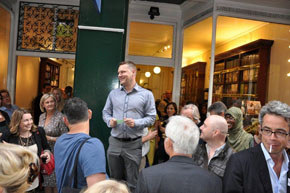
Only the day after, when I viewed the Metropolitan Police’s closed-circuit TV coverage did I spot several people I knew and yet had no idea that they had been within ten feet of me. And caught on camera was none other than John Curmudgeon Lawton, barely suppressing his pleasure at being congratulated on his recent novel in his fabulous ‘Troy’ series – though, for legal reasons, I have not seen a copy.
However I did manage to touch base with many old chums and chumettes and indeed a whole clutch of distinguished editors, including Maria Rejt, Selina Walker, Jane Wood, Kate Parkin and Martin Fletcher. I was even introduced to three delightful (and frighteningly young) ladies who, I am assured, are destined to become the crime fiction editors “of the future” though their names must, of course, go to the grave with me.
Writers were there in abundance and it was an honour and a pleasure, as it always is, to pose for a photograph with Diamond Dagger winner Lindsey Davis and exchange small talk – in Latin, of course.
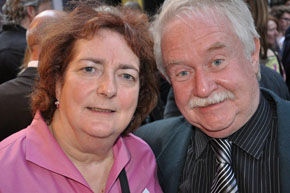
Yet such an opportunity would be wasted unless one discovered something new, which I duly did.
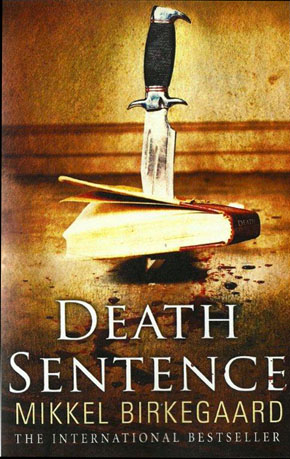
I was lobbied in a very friendly but persuasive way (as gentlemen of my age and demeanour often are in London’s West End) to read the new novel Death Sentence by Danish crime writer Mikkel Birkegaard and I was so charmed that my opinion was being sought on Nordic fiction that I instantly agreed. Sure enough, two days later, a proof copy of Mikkel’s book arrived, though it is not available to mere mortals until September when published by Black Swan and I must say it looks jolly interesting as it centres on successful crime writer Frank Føns who discovers that a killer is turning his fictional plots into real crimes.
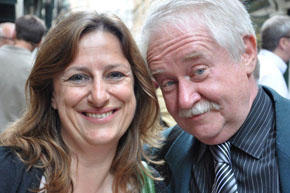
And it was positively entrancing to make the acquaintance of Norfolk crime writer Elly Griffiths, although, sadly, for legal reasons, I am unfamiliar with her novels. I feel this is a situation I must remedy.
(Photographs courtesy of Stewart Allen)
Happy Birthday Headline
With hardly time to draw breath or allow the Paracetamol to take effect, it was back up to London for the 25th birthday party of publishers Headline.

This sumptuous event took place in a decommissioned church which involved a journey ‘all the way from Great Portland Street’ as the late Kenneth Williams used to say and came with immaculately polite private security, a battalion of cheerful victualling staff and what I believe the young people call a ‘discotheque’. The fine wines and exotic sweetmeats certainly impressed the guests, who were legion, and included millionaire playboy Prince Ali Karim, who insisted on being my personal photographer for the night.
Sadly it must have been the ambient lighting (or the Moscow Mule cocktails) which resulted in pictures which fell far short of Prince Ali’s usual standard, including one of me with the vivacious ladies from Magna Large Print, who had journeyed from the Yorkshire/Cumbria border for the event.
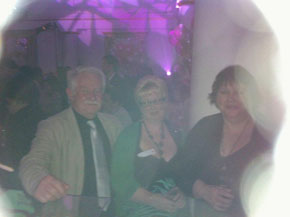
It was a splendid evening, notable for the way in which Professor Barry Forshaw rushed to the dance floor and started throwing some shapes once the music started, but for me the abiding memory will be of my arrival when I was greeted by Headline’s own in-house security staff. As my factotum Waldo had stupidly forgotten to RSVP to my invitation, there was no badge waiting for me and so one had to be made up on the spot, giving my name and a descriptor.
The name was not a problem for I was instantly recognised by the beautiful and highly efficient staff but what to put as my ‘descriptor’? Without any prompting from me, the words “Crime Legend” were added after my name. It is a title I am inordinately proud of and will use it mercilessly in future.
They don’t hate Mondays
Because of my advancing age, failing eyesight and exhausted liver, I have to limit the number of publishers’ parties I attend during the hectic summer season – unlike young whippersnappers such as Professor Barry Forshaw with his iron constitution, who never misses one – and so it was with great regret that I could not attend the launch of the new novel by husband and wife team Nicci Gerard, Blue Monday.
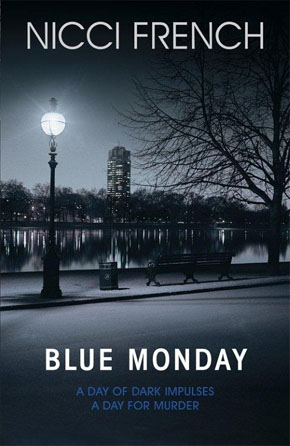 I was genuinely sad not to be there in the Berchtesgarten-like offices of publisher’s Penguin, who do throw an excellent party, as it marked a significant change in Nicci Gerard’s already distinguished career. Blue Monday is the first in a series of eight books featuring, I believe, psychotherapist Frieda Klein, which are to appear over the next ten years. This is an ambitious project and could just rank with the Swedish series featuring Martin Beck by Maj Sjöwall and Per Wahlöö, a series also published over a ten-year period and written by a married couple, just like Nicci French and Sean Gerard..... I was genuinely sad not to be there in the Berchtesgarten-like offices of publisher’s Penguin, who do throw an excellent party, as it marked a significant change in Nicci Gerard’s already distinguished career. Blue Monday is the first in a series of eight books featuring, I believe, psychotherapist Frieda Klein, which are to appear over the next ten years. This is an ambitious project and could just rank with the Swedish series featuring Martin Beck by Maj Sjöwall and Per Wahlöö, a series also published over a ten-year period and written by a married couple, just like Nicci French and Sean Gerard.....
Yet I will make a determined effort to get across the Fens to Cambridge to help celebrate the new novel by Alison Bruce.

The Calling is, I believe, Alison’s third crime novel featuring her Cambridge police detective DC Gary Goodhew although as I have not seen one (for legal reasons), I have no idea what it is about. But if Alison tells me it’s an exciting read, that’s good enough for me.
(Birth) Day of the Jackal
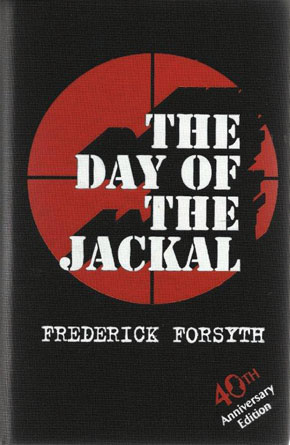
Publishers Hutchinson have produced a rather plush new edition of Frederick Forsyth’s classic thriller The Day of the Jackal to mark the 40th anniversary of a book which has never gone out of print.
It is a rightly famous thriller and if there is anybody out there in cyberspace who hasn’t read it, what the Devil are you doing reading this column?
My eye was taken with this story by one of the Daily Telegraph’s senior female columnists, celebrating the anniversary edition.

It refers, however, to the journalist’s husband who regularly re-reads the book in bed whilst disparaging his wife’s taste in ‘chick-lit’. A wise, though possibly foolish, man.
My favourite story about Day of the Jackal concerns the boss of a British publishing house (not Hutchinson) who had just returned from the Frankfurt Book Fair where the foreign paperback rights to Jackal had just been sold for a record-breaking amount of money. Calling the entire editorial team together on a Monday morning, the publishing boss demanded to know which of his editors had turned down Freddie Forsyth’s manuscript. When a young, female editorial arm was sheepishly raised, the publisher uttered the immortal line: “Get your coat on the way out.”
There is no way, of course, I can compete with Mr Forsyth, but next year one of my early novels, Angel Touch, celebrates 20 years of being continuously in print – in Japan – thanks to the excellent taste of legendary publisher Hiroshi Hayakawa and I am told that the book continues to sell several (at least two) copies a year although I have not as yet heard details of how the company plans to celebrate the anniversary....

Back in the Jug Agane
My detractors – and they are legion – will no doubt be happy to hear that I am going to prison (again) this month.

Well, not prison exactly, but to the Essex Police Museum adjacent to Chelmsford Prison, specifically on the evening of July 7th when that eminent Sherlockian Roger Johnson will be giving a lecture entitled Look To The Lady: The life and crime fiction of Margery Allingham.
Apart from being a famous Essex girl, Margery Allingham was one of the brightest lights of British crime writing in the ‘Golden Age’ of the 1930s and beyond, to her death in 1966. I am sure Roger’s lecture will be immensely popular locally and I urge anyone thinking of attending to reserve a ticket (a paltry £3, with proceeds helping the Museum) by emailing: museum@essex.pnn.police.uk
Hunting with Moles
For reasons which genuinely escape me, I appear to be persona non grata with publishers Orion and no longer get invited to their sumptuous alcoholic lunches briefings whenever they announce new crime titles. Fortunately I retain the services of a mole within that particular publishing empire who at great personal risk supplies me with top secret advance information, i.e. they send me the Orion Catalogue.
Which is jolly useful, as otherwise I would not have had the following important dates, around which to schedule my reading later this year as the nights draw in.
November 1st will be a major date on the calendar as it will see the publication of The House of Silk the new, officially-sanctioned, Sherlock Holmes mystery by Anthony Horowitz, the author of the bestselling Alex Rider series and, of course, the brains behind the splendid Foyle’s War. I am seriously looking forward to his take on the iconic Holmes, though I hear mutterings that some of the more fanatical members of Sherlock Holmes Society are already sharpening their sword-sticks.
I am also looking forward to January when a new novel, an untitled one as yet, appears from the charming Tim Griggs, who is probably better known to readers of this column by his pseudonym Tom Macauley, under which he penned the excellent thriller The Warning Bell in 2009.

Before then, in fact just about now, Orion start to roll out splendid new editions in their original jackets, from John Gardner’s incarnation as the official author of James Bond novels. I am not sure whether the intention is to republish the whole of Gardner’s Bond output (he wrote more than Ian Fleming did) but certainly five are available now and it is a splendid time to see them, just when Jeffrey Deaver’s Carte Blanche refreshes the franchise and John Gardner’s own splendid creation Boysie Oakes is revived in the Top Notch Thriller edition of The Liquidator.
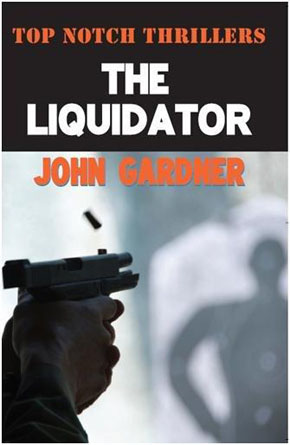
Not Flagging, Flagging Up
The stream of interesting books arriving daily at Ripster Hall is assuming tsunami proportions and there are several I feel duty bound to flag up.
From Headline publishers; two very different thrillers. Firstly, the latest ‘Nick Heller’ mystery Buried Secrets by American bestseller Joseph Finder, in a series described by Lee Child, no less, as “action-packed” and “full-throttle”
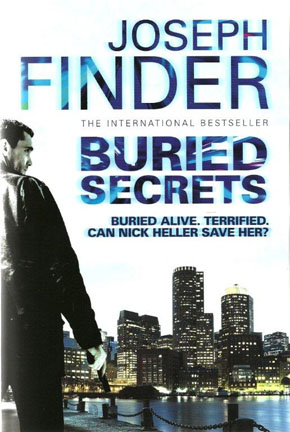 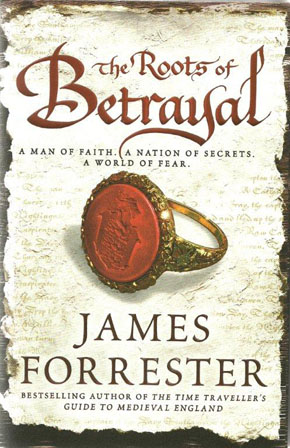
Then, with a complete change of pace and setting, comes the second historical thriller from ‘James Forrester’ – better known as the historian Dr Ian Mortimer.
The Roots of Betrayal concerns a Catholic plot against Queen Elizabeth I and is set in the year 1564, which as all my readers will know was something of a magical year, seeing the birth of William Shakespeare and that well-known Californian private eye, Christopher Marlowe.
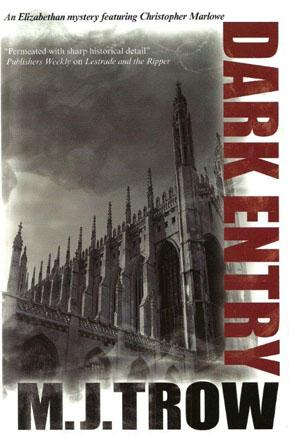 Tudor England is definitely the fashionable (nay, profitable) place to set history-mysteries these days and this one, naturally, features ace Elizabethan spymaster Sir Francis Walsingham, whereas M.J. Trow’s latest, Dark Entry, published under the Crème de la Crime imprint, actually features the spy (and possible double or triple agent) Christopher “Kit” Marlowe, playing detective (“The name’s Marlowe” he constantly reminds people) in a case of murder in King’s College Cambridge in 1583, just about the time he was himself graduating from Corpus Christi. (They graduated young from Cambridge in those days, so they could get straight into the spying game and thus afford costly student loan repayments.) Tudor England is definitely the fashionable (nay, profitable) place to set history-mysteries these days and this one, naturally, features ace Elizabethan spymaster Sir Francis Walsingham, whereas M.J. Trow’s latest, Dark Entry, published under the Crème de la Crime imprint, actually features the spy (and possible double or triple agent) Christopher “Kit” Marlowe, playing detective (“The name’s Marlowe” he constantly reminds people) in a case of murder in King’s College Cambridge in 1583, just about the time he was himself graduating from Corpus Christi. (They graduated young from Cambridge in those days, so they could get straight into the spying game and thus afford costly student loan repayments.)
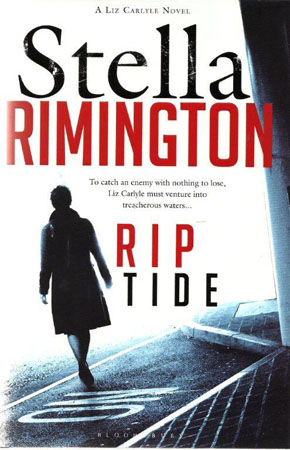 And speaking of spies, spymasters and indeed spy-mistresses, I cannot fail to mention the new novel Rip Tide by Dame Stella Rimington, the former Director-General of MI5, which is published this month by Bloomsbury. And speaking of spies, spymasters and indeed spy-mistresses, I cannot fail to mention the new novel Rip Tide by Dame Stella Rimington, the former Director-General of MI5, which is published this month by Bloomsbury.
Featuring her MI5 Officer heroine Liz Carlyle, Rip Tide starts with a pirate attack on a cargo ship off the coast of Somalia – a popular recent theme, already utilised this year by Wilbur Smith and Elmore Leonard in their latest novels, so Dame Stella is in good company. I am sure Rip Tide will be a ripping read, but then I have to say that as she still has a file on me....
|
If action thrillers by action men are your thing, then you really should check out the first foray into fiction of Ross Kemp, best known for his television work as an actor (infamous hard man of Eastenders) and as a maker of award-winning documentaries in some notoriously uncomfortable places.

Starring an ex-soldier (of the Special Reconnaissance Regiment, injured whilst on active service in Basra), Devil To Pay published by Arrow, takes the courageous step of jumping the narrative into the present tense to lend a sense of drive and urgency. In fiction-writing terms this is a strategy as high risk as going on patrol in Basra armed with a toothbrush, but in this case, in the voice of an ex-soldier, it works well.
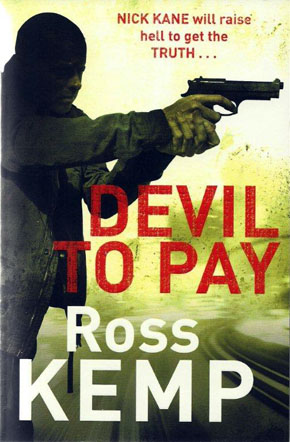
“Don’t bother with Stieg”
I am so relieved that I no longer have to worry about not reading any of the many biographies, Guides To, films based on the books of, or indeed, the actual books of Stieg Larsson, for the word is out and official: “Don’t bother with Steig.”
Now 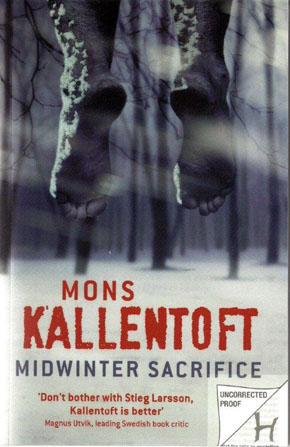 before the injunctions start to fly, let me point out that I didn’t say this, I am merely following the instructions of Magnus Utvik, who is described as a “leading Swedish book critic” (aren’t we all?) on the cover blurb of the forthcoming thriller Midwinter Sacrifice by fellow Swede Mons Kallentoft, to be published here by Hodder in October. before the injunctions start to fly, let me point out that I didn’t say this, I am merely following the instructions of Magnus Utvik, who is described as a “leading Swedish book critic” (aren’t we all?) on the cover blurb of the forthcoming thriller Midwinter Sacrifice by fellow Swede Mons Kallentoft, to be published here by Hodder in October.
In fact, Mr Utvik, whom I believe to be a novelist and poet, is quoted as saying: “Don’t bother with Stieg Larsson, Kallentoft is better” and Midwinter Sacrifice will be Mons Kallentoft’s introduction to an English crime fiction audience.
I have to admit that where I possibly know far too much about the late Stieg Larsson (and have to declare an interest in that I am a mentor to Scandinavian crime superstar Nisse Ektorp), I know absolutely nothing about Mons Kallentoft other than as he enjoys posing for his official author shot gazing into a mirror, the chances of him being a vampire are remote.
 Midwinter Sacrifice centres on a particularly nasty case for the Violent Crimes Squad in Linkoping. Now Linkoping is not, as you may have first have thought, a method of connecting self-assembly shelving, but is in fact a town in southern Sweden with roughly the same population, but hopefully none of the charisma, of, say, Chelmsford. The lead character is female detective Malin Fors who, unusually for fictional police persons, has an estranged spouse, difficult and demanding parents and a troublesome young daughter... Midwinter Sacrifice centres on a particularly nasty case for the Violent Crimes Squad in Linkoping. Now Linkoping is not, as you may have first have thought, a method of connecting self-assembly shelving, but is in fact a town in southern Sweden with roughly the same population, but hopefully none of the charisma, of, say, Chelmsford. The lead character is female detective Malin Fors who, unusually for fictional police persons, has an estranged spouse, difficult and demanding parents and a troublesome young daughter...
I have not, of course, read Mr Kallentoft’s book yet, but now I have taken Mr Utvik’s advice and no longer feel the need, slight though it was, to plough my way through the Larsson canon. What is more, I will seek an opinion from that distinguished academic Sir Charles Underhill – a close friend of both myself and Reginald Hill – who these days communicates almost entirely in Old Norse, but who has made it a lifetime quest to identify and catalogue all the jokes in Scandinavian crime fiction.
And even as I write this, another new crime novel, Fear Not by Norwegian Anne Holt drops through the letter box, its jacket bearing a sticker courtesy of publisher Corvus bearing the exhortation “Step aside, Stieg Larsson” which comes from ‘Red Magazine’, a publication I was previously (and remain) unaware of.
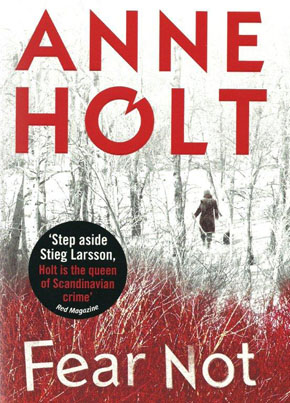
Could the writing, as they say, be on the Wall (ander)?
Nothing Like a Dame
I am rarely asked to be a judge for anything these days, as most judging positions in the crime fiction field are now stipendiary or even hereditary, so it was a distinct honour to be asked to represent the UK – nay, Europe – on an international panel to decide the 2011 Dame Ngaio Marsh Award for best crime novel by a New Zealander.

In fact it is a double honour, for I have been invited back as a judge after serving last year for the inaugural award and despite the fact that I totally failed to predict the winner and discovering that the time difference between Ripster Hall and New Zealand does not work in my favour when it comes to putting a bet on after hearing the result.
The judging panel for this year’s ‘Ngaio’ comprises: myself, a Canadian, an American and a clutch of New Zealanders including the ace crime fiction blogger Craig Sanderson, who masterminded the creation of this award with its splendid trophy and indeed has set up an interweb page dedicated to the Award at: http://www.facebook.com/pages/Ngaio-Marsh-Award-for-Best-Crime-Novel/233991183282311
TV Times
For many years now no-one has asked my opinion on which crime-based television dramas should be honoured with an award for outstanding contribution to the genre. In a way I have been grateful not to have the pressure of having to actually watch television, preferring to spend my evenings in the library here at Ripster Hall with a firkin of Adnam’s Broadside and a good book or three.
Of course I have provided the below-stairs staff with a set – one has to these days, or they claim their Human Rights are being impinged – and now that the local “analog” (whatever that means) transmitter is to be switched off and television will end for ever, they are watching as much as they can.
By common consent, at least among the female staff, this year’s heart-throb detective was undoubtedly Zen from the books by my old and distinguished friend the late Michael Dibdin, closely followed by Jackson Brodie in Case Histories, brilliantly adapted (it could not have been easy) from the wonderful books of Kate Atkinson.
Television detectives not adapted from books have, however, fared well this year with the impressive Luther (although not having seen the first series, I am often bemused whilst being impressed), and I have recently discovered Scott & Bailey which is a sort of Mancunian ‘Cagney & Lacey’ and is quite excellent with, unusually, not one but three strong female characters.
The one-off crime dramas fared less well below stairs. The Shadow Line had superb production values and a stunning cast, but plumped for grand opera tragedy rather than making sense. (If you want crime drama as tragic opera, rent The Sopranos box sets). And the Suffolk-set thriller Injustice, whilst again blessed with an excellent cast, lost me the minute a Suffolk farmer explained to an irritable policeman that the reason there were no animals (livestock) on his land was because “this is an agricultural farm”. Not even in darkest Suffolk.... which, incidentally, scrubbed up very nicely for the cameras.
By far the most impressive crime show on television this year was, in my not-so-humble opinion, Justified based on a short story by Elmore Leonard and now in its second season and I shall continue to maintain this even though I have not met another human being who has actually seen it.
But then, as I say, nobody asks my opinion, humble or not so.
T.B.R.P.
I first came across the expression “TBRP”, or To Be Read Pile, thanks to conversations with some enthusiastic mystery readers in America and I am not proud of the fact that my very own TBRP is now so high it sways dangerously at the side of the marital four-poster.
Admittedly some books may have been there a while, or have been put there for re-reading, such as my much-loved copy of W.R. Burnett’s High Sierra.
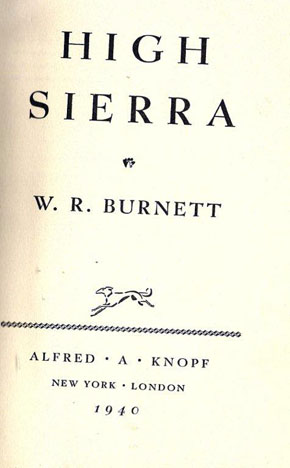
Others are brand spanking new and not yet available to the man or woman in the (mean) street, such as the latest surreal adventure to feature Welsh private detective Louie Knight,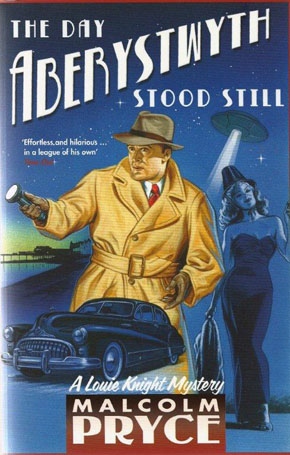 The Day Aberystwyth Stood Still by Malcolm Pryce, published by Bloomsbury. The Day Aberystwyth Stood Still by Malcolm Pryce, published by Bloomsbury.
If you haven’t yet discovered the ‘Aberystwyth Chronicles’ as they are sometimes known, then you’ve missed a trick or six actually, for this has been one of the most consistently funny series of comic crime novels in the last ten years, at times bizarre and always as disrespectful of the Welsh as one can be without getting one’s cottage burned.
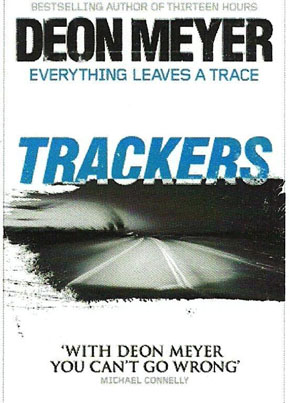
And one book which will certainly not be on the TRBP for long is the new Deon Mayer thriller Trackers coming from Hodder in September.
Having discovered the work of Deon Meyer at roughly the same time as that of fellow South Africans Roger Smith and Mike Nicol, I am convinced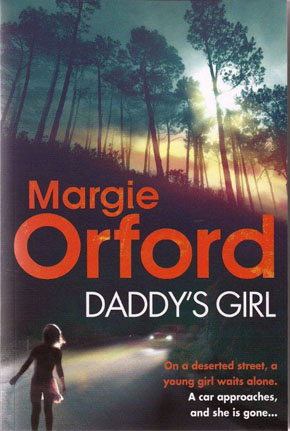 that the discerning reader should look to the Southern Cross rather than the Northern Lights for new and interesting crime fiction. that the discerning reader should look to the Southern Cross rather than the Northern Lights for new and interesting crime fiction.
To test this theory, I have added to my groaning pile Daddy’s Girl, coming from publisher Corvus, by Margie Orford, who lives in and sets her crime fiction in Cape Town.
I am obviously behind-the- times in discovering Margie Orford, for my copy has arrived with an enthusiastic quote for “Crime Fiction expert Barry Forshaw” so who am I, a mere Muggle, to disagree?
H.B.R.P.
Just as my To Be Read Pile grows, I can report that my Has Been Read Pile has shrunk recently, albeit slightly, thanks to the longer hours of daylight and a two-for-one offer at Spec Savers.
At the insistence of my friends Peter Quinn, a distinguished connoisseur of crime fiction from leafy Buckinghamshire, I finally got around to reading that famous spy novel Drink To Yesterday by Manning Coles, which was published during WW2 but concerns a young British spy undercover in Germany during WW1.
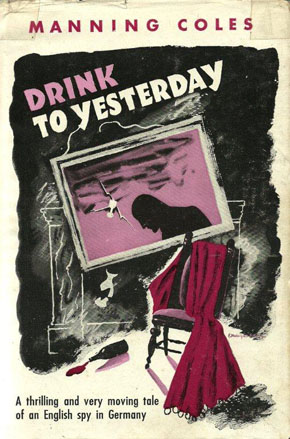 I am ashamed it has taken me so long to getting round to reading it for it is a fine book which looks at the conflicts in a spy’s life above and beyond the more obvious dangers. The story is a tender one and heartbreakingly sad at the end, and its background in English public schools as a recruiting ground for agents presaged a theme John le Carre was to exploit quite brilliantly three decades later. I would even suggest that the romantic element (or the element of unfulfilled romance) possibly influenced the spy novels of the late Ted Allbeury, again some thirty years on. I am ashamed it has taken me so long to getting round to reading it for it is a fine book which looks at the conflicts in a spy’s life above and beyond the more obvious dangers. The story is a tender one and heartbreakingly sad at the end, and its background in English public schools as a recruiting ground for agents presaged a theme John le Carre was to exploit quite brilliantly three decades later. I would even suggest that the romantic element (or the element of unfulfilled romance) possibly influenced the spy novels of the late Ted Allbeury, again some thirty years on.
And my reading for pleasure has posed an interesting question.
Just how often does one think of the assassination of King Alexander of Yugoslavia, in Marseilles in 1934, these days – the first political assassination to be filmed by the news-reels or so I’m told? Well the answer is twice in the last week, for the event is mentioned in two atmospheric thrillers set in the 1930s.
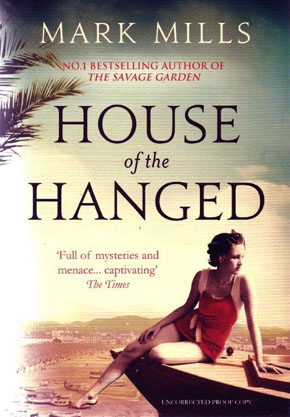 The first was Mark Mills’ elegant novel House of the Hanged, now out from HarperCollins, which I mentioned briefly last month. It fully lived up to my expectation in that I expected lots of period detail and atmosphere (the French Riviera in the 1930s), subtle and finely drawn interplay between the characters (especially the women in this one) and particularly fine writing. The first was Mark Mills’ elegant novel House of the Hanged, now out from HarperCollins, which I mentioned briefly last month. It fully lived up to my expectation in that I expected lots of period detail and atmosphere (the French Riviera in the 1930s), subtle and finely drawn interplay between the characters (especially the women in this one) and particularly fine writing.
Mark Mills seems to enjoy setting his fiction in the not-too-distant past and here, despite the brutal nugget at the centre of the plot (a blood feud between a ‘retired’ British spy and his Soviet enemy), he uses his setting well and populates it with a cast of characters created with genuine humanity and, above all, intelligence.
I could say much the same about the writing of American Thomas H. Cook in his The Quest for Anna Klein, which also mentions poor old King Alexander, to be published by Corvus in September. Already a very well-regarded crime-writer, Cook’s reputation should precede him although his new publishers insist this could be his “break-through book” though quite what someone as distinguished as Thomas H. Cook has to break through is beyond me.
 Certainly The Quest for Anna Klein is something of a new departure for him as it is a spy story (very much in the Alan Furst or Charles McCarry mould) set in 1939 about a plot to kill Hitler, much of it told in flashback in the 2001 ‘confession’ of one of its principals. Certainly The Quest for Anna Klein is something of a new departure for him as it is a spy story (very much in the Alan Furst or Charles McCarry mould) set in 1939 about a plot to kill Hitler, much of it told in flashback in the 2001 ‘confession’ of one of its principals.
If the cross-cutting narrative between 1939 and 2001 is occasionally mildly disruptive to the suspense as the plot starts to take shape, there is much to admire here. The central character of ‘Anna Klein’ is enigmatic from the start but she clearly holds a mystical attraction for the men she encounters, not the least being the narrator Danforth, a well-heeled New Yorker who, thanks to her, commits himself to a career in the sh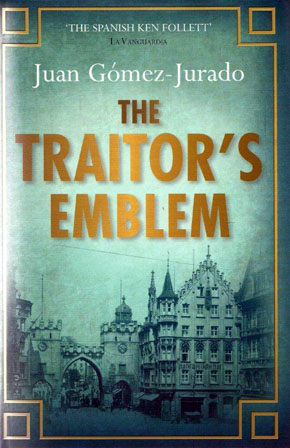 adowy world of espionage. adowy world of espionage.
Set mostly in Germany in the 1920s (and therefore free of references to King Alexander, though not Hitler) and translated from the Spanish, The Traitor’s Emblem by Juan Gomez-Jurado and published by Orion, may at first sight seem like a thriller centred of Freemasonry. There are Freemasons in it, certainly, but actually that’s really rather peripheral to the somewhat disjointed main story (the main character disappears to Africa for several years) which is actually a family saga of betrayal, snobbery, forbidden romance and revenge, set in depression-hit, post-war Munich.
One reviewer in a Spanish newspaper has labelled the author “The Spanish Ken Follett”. I think “The Spanish Jeffrey Archer” might be more accurate.
Revival Day
I am often derided by the young whippersnappers of the genre for using the phrase “the old ones are the best”, though my regular detractors do seem to have gone rather quiet since B.B. King headlined at Glastonbury last month.
However I offer no apologies for reporting that this month’s revivals from Ostara Publishing’s Top Notch Thriller imprint are both stunning exercises in the craft of thriller writing, despite being originally published almost thirty years ago and both having a literary heritage taking them back a further forty or fifty years.
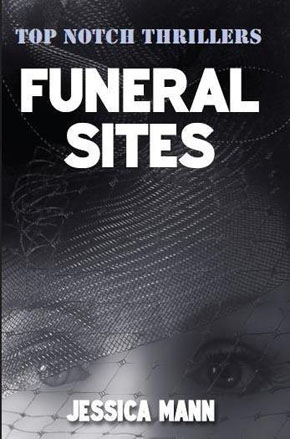 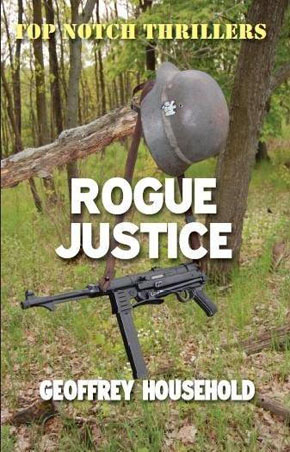
Funeral Sites by the vivacious Jessica Mann is not only the book which introduced her best-known series character, feisty archaeologist Tamara Hoyland, but was her 1981 updating, from a feminist stance, of John Buchan’s The 39 Steps. Rattling along at a breathless pace, Funeral Sites is a clever, and affectionate, homage to the great-granddaddy of the flight-and-pursuit school of thriller writing.
Geoffrey Household (1900-1988) made his name in that very school of thrilling writing, with his classic Rogue Male in 1939. Despite, I am sure, regular pleas from his publishers, it was forty years before he started writing the sequel and Rogue Justice finally appeared in 1982, though has been inexplicably out of print for many years.
Rogue Justice compliments and completes the story of the anonymous ‘rogue’ English aristocrat of the earlier story when his attempt to assassinate Hitler resulted in the big game hunter becoming the hunted. When his second elaborate plan to get close to his target collapses, the Rogue Male declares open warfare on the Nazi ideology which has destroyed the Europe, and the woman, he loved. In an epic and bloody campaign ranging from the Baltic to the Balkans, our hero dispenses his own violent form of justice in a nihilistic quest to find his own peace
Further details of revived thrillers and crime novels from authors who do not deserve to be forgotten can be found on www.ostarapublishing.co.uk.
Angels Everywhere
My survey of copies of ‘Angel’ books in exotic places continues with this example from Beverley, a delightful Mayan lady and member of the staff at the Corozal Academy of Renewable Energy in Belize, or British Honduras as some of my more mature readers will know it.
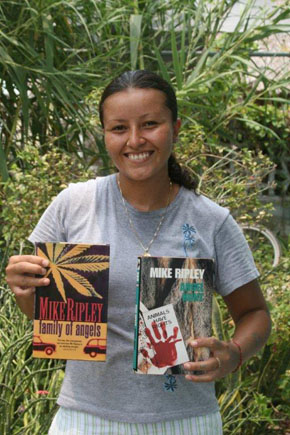
I am sure that my novels are not used as text books in the academy, which is a serious residential institution with the very laudable remit to promote methods of renewable energy in the Caribbean and the Americas. Anyone interested in learning more should go to the Academy’s website at www.corozalare.com.
Pip! Pip!
The Ripster
(Crime Legend)
|